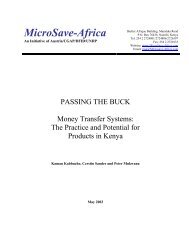Create successful ePaper yourself
Turn your PDF publications into a flip-book with our unique Google optimized e-Paper software.
6<br />
In the late 1960s, the relatively new Kennedy<br />
School <strong>of</strong> Government <strong>of</strong>fered a one-year<br />
public administration program oriented more<br />
toward economics and analytical studies than<br />
administration. Many students in that era were<br />
career government employees sponsored by<br />
their agencies, unlike Sweet and Mickelwait.<br />
So perhaps it was inevitable that the two would<br />
meet. Mickelwait soon began to notice Sweet<br />
walking around campus in a white rabbit-skin<br />
coat. “He carried a briefcase and never went<br />
to class,” Mickelwait said, and seemed to have<br />
“five hundred close personal friends.”<br />
Charlie Sweet was indeed what may be called<br />
“a collector <strong>of</strong> people,” and Mickelwait was<br />
soon part <strong>of</strong> the collection. Another was John<br />
M. Buck, an honors graduate from the University<br />
<strong>of</strong> Michigan and a Fulbright Scholar. As a<br />
company commander in the Army during the<br />
Vietnam War, Buck served two tours in combat,<br />
one under Alexander Haig, with much <strong>of</strong> his<br />
time in hot zones near the DMZ that (theoretically)<br />
divided North and South Vietnam. Like<br />
Sweet and Mickelwait, he was ready to follow a<br />
new path, and had come to the Kennedy School<br />
all on his own.<br />
As the year progressed, Sweet gathered a group<br />
<strong>of</strong> a dozen students interested in development<br />
who came to be known as his “12 disciples.”<br />
For endless hours they talked about how they<br />
could create a new company to do development<br />
work, a vision that Sweet believed in<br />
fiercely. He was, in fact, so much a man <strong>of</strong> ideas<br />
that he could hardly be bothered to write term<br />
papers or study for exams. Instead, he talked<br />
constantly and bit the stem <strong>of</strong> his pipe—you<br />
knew he was excited when you heard the stem<br />
cracking. Sweet likely cracked a lot <strong>of</strong> pipes<br />
that year at Harvard. At the time, Mickelwait<br />
was also more attuned to ideals than practicalities,<br />
so the presence <strong>of</strong> the third man became<br />
crucial. “In the midst <strong>of</strong> our flights <strong>of</strong> fancy,”<br />
Mickelwait recalled, “John Buck could bring it<br />
back to Earth.”<br />
As the year at the Kennedy School drew to<br />
a close, Sweet became obsessed with his<br />
emerging idea to the exclusion <strong>of</strong> all else. In<br />
fact, it seemed unlikely that he would earn his<br />
master’s degree until the May 1970 shootings<br />
at Kent State prompted Harvard to cancel all<br />
final exams. When Sweet called for his disciples<br />
to move with him to Washington, D.C., and put<br />
their plans into action, most <strong>of</strong> them melted<br />
away. While a dozen or so people did invest a<br />
few hundred dollars in the fledgling firm—an<br />
investment that was quickly repurchased from<br />
most <strong>of</strong> them—only Mickelwait and Buck took<br />
the leap and went to work for it.<br />
Three Guys, Savings, and<br />
Credit Card Debt<br />
This decision was no mere pipe dream, for<br />
Sweet had already incorporated a company.<br />
Earlier that spring he had contacted David<br />
Gunning, a corporate lawyer and an old friend<br />
from undergraduate days at Cornell, who put<br />
him in touch with some attorneys who knew the



